Getting reliable GPS readings matters a lot when I’m out on the water. But even with the latest tech, I’ve noticed that rough sea conditions can sometimes cause my GPS to act up. When the weather turns, big waves or storms move in, or I’m far offshore, that peaceful blue screen with my position can quickly become less reliable. I’ve learned that knowing why this happens and how to fix inaccurate GPS readings can make a big difference in safety and navigation.
Understanding GPS accuracy in rough sea is important for every sailor, fisherman, and boater. Inaccurate GPS readings in rough waters aren’t just an inconvenience; they can affect route planning, create confusion, and lead to risky situations if not addressed early. Here’s how sea conditions impact GPS, what causes signal issues, and the steps I use to improve GPS readings on my boat. These GPS accuracy tips for sailors come from experience, research, and conversations with fellow enthusiasts who rely on their devices all season long.
Click here to buy the best GPS for boats
Why GPS Accuracy Drops in Rough Sea
The first time I noticed my GPS showing odd locations, I assumed the unit was broken. Before spending money on repairs or replacements, I started digging in to see why the problem showed up only on rough days at sea. It turns out, the impact of sea conditions on GPS goes deeper than I thought.
How the GPS System Works at Sea
- GPS stands for Global Positioning System. It works by connecting to multiple satellites in orbit and calculating my position based on where the signals overlap.
- A GPS receiver (the handheld or dashmounted device) listens for signals and needs a clear line of sight to the satellites. The more satellites it can “see,” the more accurate the reading will be.
- When I’m in calm waters, with the sky wide open above, these signals typically come through clean. But when the sea gets rough and the boat starts pitching and rolling, those connections can become unreliable.
Typical Causes of Inaccurate GPS in Rough Waters
- Boat movement: Heavy rolling, pitching, and constant spray can affect the GPS receiver’s ability to keep a stable lock on the satellites. Sometimes, the antenna on my boat dips below deck level or gets blocked by equipment or wave spray.
- Weather interference: Thick clouds, rain, or electrical activity from storms can scatter or weaken satellite signals, leading to jumps or sudden drops in accuracy. This problem gets worse the further offshore I am.
- Signal reflections: When waves are high, satellite signals may bounce off the water’s surface, causing what’s known as multipath errors. The GPS receiver sometimes gets mixed signals; one direct from the satellite, another reflected from the water. This mix-up can make my location seem off by dozens of meters.
- Equipment limitations: Not all GPS receivers have the same level of sensitivity, and older models struggle more with rough sea conditions. Some budget devices also update positions slowly, so I see laggy or jumping locations when my boat moves quickly through big swells.
Combining these factors helps explain why even a system designed for global coverage can struggle when seas get rough. Knowing the facts behind GPS signal issues in rough waters helped me come up with better solutions.
How Weather Affects GPS Accuracy
Weather is one of the most common reasons for inaccurate GPS readings at sea. When skies turn grey and winds pick up, I know to expect some glitches from my charts and navigation apps.
Weather Factors That Cause GPS Problems
- Heavy rain: Large raindrops can disrupt or block satellite radio signals. I’ve noticed delays in my GPS fix and increased position jumps on stormy days.
- Thunderstorms and lightning: Electrical activity in the atmosphere creates noise that can disrupt the weak satellite signals before they reach my boat’s receiver.
- Fog: Although fog isn’t dense enough to block satellite signals entirely, thick fog often comes alongside extra moisture in the air, which can dampen transmission and lead to weaker fixes.
- Cloud cover: Dense layers, especially with water vapor or mixed with pollution, can weaken signals, although this problem is usually smaller than for rain or storms.
Real-World Impact of Sea Conditions on GPS
One summer, I found myself suddenly lost on my electronic chartplotter during a surprise squall. My GPS was showing me half a mile off my real location. Not only did the rain make visual cues harder to spot, but the surge in waves caused my antenna to get soaked. Since then, I always double-check my GPS’s reliability and keep a backup method for navigation. After this experience, I also reviewed my anchor alarm and waypoint settings to adapt when GPS accuracy drops abruptly. I started comparing tracks from several trips and saw that accuracy issues tended to spike when heavy cloud systems moved in, even with modern gear. That’s when I decided to trace out fallback routes in advance if the weather looked doubtful. Since implementing those small habits, my trips have been less stressful, and I can focus more on enjoying the adventure than worrying about losing my position when the skies turn dark.
Common GPS Signal Issues on Boats
After struggling with faulty readings during choppy conditions, I made a checklist of the most frequent GPS signal issues when boating. Knowing what’s likely to cause the problem speeds up GPS troubleshooting for boats. I’ve also asked fellow boaters about odd GPS behaviors they’ve noticed and compiled the most common reports:
Signal Loss
- Outages: My receiver sometimes loses all connection for a few seconds, especially if heavy spray or a passing vessel’s equipment blocks the antenna.
- Dropouts: The GPS occasionally drops from eight satellite connections down to two or three, which isn’t enough for normal accuracy.
Inconsistent Position Updates
- Lag: The displayed boat location may “pause” for several seconds, then suddenly jump ahead, leading me to overshoot turns or miss waypoints.
- Erratic readings: When multipath errors happen, my position drifts back and forth on the screen even when I’m holding a steady course.
Bad Satellite Geometry
- Poor satellite spread: Sometimes, even with clear skies, my accuracy drops because the visible satellites are all in the same area of the sky, making triangulation less precise.
I’ve found that these issues are more common on older or poorly maintained systems, but even the most modern GPS units are affected by rough sea conditions and the resulting signal disruptions.
How to Improve GPS Readings in a Rough Sea
After seeing how frustrating and risky inaccurate GPS readings can be, I worked out a set of steps to improve my setup. Here’s what I do to get the best possible GPS accuracy in rough sea. I also check with my marina’s tech specialist about any new device updates or antenna products that could give my system a fresh boost.
Install the GPS Antenna in an Open Location
- Mount the antenna as high up as possible, with no solid objects above it. The fewer obstructions, the better. I run mine up on the cabin roof or radar arch.
- Avoid placing the antenna under metal frames or glass covered by window tint. If my boat’s hard top is metal, I’ll mount the GPS receiver off to the side or on a pole mount.
Use Modern Receivers and Update Firmware
- Devices designed in the last five years typically have better sensitivity, process multipath errors more accurately, and maintain a faster position fix, even in tough weather.
- I like to check the manufacturer’s site for firmware updates, as these can fix bugs and improve how the device locks onto satellites.
Keep Electronics Dry and Corrosion-Free
- When spray hits, saltwater can get into connectors and wires, hurting performance. I make sure all cable connections are sealed with marine-grade shrink tubing and check for corrosion every few weeks.
- Having a weather shield or splash cover for dash-mounted GPS units cuts down on issues.
Carry a Backup System
- I always bring a handheld GPS as a backup. Even if my main chartplotter goes haywire, the handheld runs on batteries and has its own antenna.
- For trips out of sight of land, I usually plot my route as waypoints on both the dash unit and my handheld before leaving shore.
Download and Update Offline Charts
- Preloading updated charts onto both my main units and phone apps means I can keep navigating even if the GPS feed falters.
- With local charts stored, I reduce the need to rely on mobile data or realtime downloads, which are unreliable offshore.
Following these steps goes a long way toward fixing inaccurate GPS readings and helps with peace of mind for every trip on the water. I also recommend learning how to set anchor alarms and drift monitoring—they’re helpful features for staying on top of your location if GPS signals fade in and out on an anchor stop.
GPS Troubleshooting for Boats: What to Check
If my GPS is showing the wrong position or dropping in and out, I run through a checklist before panicking. Here’s what I look for and how I fix inaccurate GPS readings:
- Is the power supply stable? If the boat’s battery is low or connections are loose, the device might glitch. Checking the voltage and making sure connections are tight helps.
- Are antennas and wires intact? A damaged antenna cable, pinched wire, or corroded plug blocks the weak satellite signals. I examine all wires and clean contacts regularly.
- Does the display show low satellites or weak signal bars? If so, I check for visible obstructions and see if repositioning the antenna helps.
- Are other electronic devices causing interference? Radios, radar, or even a nearby mobile phone can create noise. Separating cables and repositioning devices often clears this up.
If these steps don’t solve the problem, I try moving the GPS receiver to a more open part of the boat temporarily. If the issue only appears during rough seas, sometimes just steering briefly to a different course or waiting out a squall gives the system time to recover. Being patient and methodical helps me sort out temporary glitches from hardware failures. When in doubt, I consult the device’s manual or check online boating forums, where other sailors may have solved similar problems. Sharing experiences within the boating community can help uncover unusual fixes or highlight patterns unique to specific gear models.
Tips for Improving GPS Accuracy at Sea
I’ve put together these GPS accuracy tips for sailors after years of troubleshooting with friends and reading up on best practices. These steps have saved my trips more than once. I always suggest sharing these basics with everyone on board, so no one is caught off guard by a GPS glitch:
- Maintain a clear sky view. The more sky my GPS can “see,” the better its accuracy. Moving antennas away from masts, radar, and railings keeps signals strong.
- Monitor satellite status. Many modern units show which satellites they’re using and signal strengths. If a device loses lock on several at once, I reassess my antenna placement or wait for a better spread.
- Take signal readings before heading offshore. It helps to check signal quality in the harbor while the weather’s calm. That way, if readings go bad later, I know it’s not a hardware issue.
- Use position averaging. Some advanced GPS units let me average readings over a few minutes to reduce jitter caused by multipath and boat movement.
- Combine with other navigation tools. Even with GPS, I keep paper charts, a compass, and radar ready. Visual checks with shorelines or buoys are super important if readings go bad.
- Learn manual navigation basics. Practice identifying landmarks, using bearings, and plotting your route by hand, so you’re ready if electronics fail.
- Check battery health regularly. Weak batteries lead to device shutdowns just when you need them most. Spare batteries for handhelds and a jump starter in your kit can make all the difference.
Questions and Troubleshooting Scenarios
What should I do if my GPS loses position during a storm?
- Keep calm. Switch to backup navigation tools (charts and compass).
- If safe, slow the boat or seek shelter until the weather passes.
- Check if the antenna needs drying or repositioning, and monitor when the signal returns.
Is mobile phone GPS more or less accurate on rough water?
Phones usually have lowerquality antennas than marine units and may rely on cell towers to help fix positions. Offshore, where cell service drops out, I get less accurate locations on my phone. For serious navigation, a marine GPS is a better choice.
Why does my GPS work fine on lakes but not offshore?
Large bodies of water make multipath errors (reflections off waves) more common. Offshore, there’s also more exposure to severe weather and fewer ground-based correction signals. It’s a tougher test for any receiver, which is why better antennas and backup options really matter for open water trips.
How often should I check or replace my boat’s GPS system?
I do basic checks before every trip and a deep clean and inspection twice a season. If I notice repeated problems in different conditions or my unit stops locking onto satellites, it’s time for a professional check or to consider upgrading. I find it’s useful to log GPS outages or problems in a notebook, so patterns are easier to spot. This habit makes diagnosing recurring issues much quicker, and I don’t waste time or money replacing a device when a simple cable fix might do the trick.
Next Steps for Reliable GPS at Sea
Getting the most out of GPS when waves pick up calls for a mix of solid equipment, careful planning, and knowing what to do if things go wrong. Over time, small habits like checking antenna placement, updating firmware, and keeping backup options ready have helped me trust my navigation even when the weather turns. Having a system and process for dealing with inaccurate GPS readings solutions pays off with less stress and safer time on the water. In my experience, the peace of mind a reliable GPS provides is well worth the preparation, especially on longer offshore trips where weather and conditions can swing fast.
Your Action Plan:
- Review your GPS antenna placement and make sure it has a clear sky view. Don’t forget to look for new mounting options if you’ve added equipment or changed your boat’s layout this season.
- Check all cable connections and power sources for corrosion or damage before heading out. Keep a small toolkit with electrical cleaner spray and extra connectors for quick fixes at sea.
- Carry a backup navigation option, such as a handheld GPS and paper charts. Try running test routes on backup gear beforehand so everyone on board is familiar with it in case of emergency.
- Practice switching to manual navigation when your GPS glitches, so you aren’t caught off guard in real situations. Roleplay these scenarios periodically so reaction times are quick and confidence is high.
Reliable GPS is possible at sea, even in rough conditions, with a little preparation and the right gear. If you’ve got tips or stories of handling tricky GPS problems when the weather’s bad, I’d love to hear them; sharing advice helps all of us enjoy safer, more confident boating adventures.
As an Amazon Associate I earn from qualifying purchases.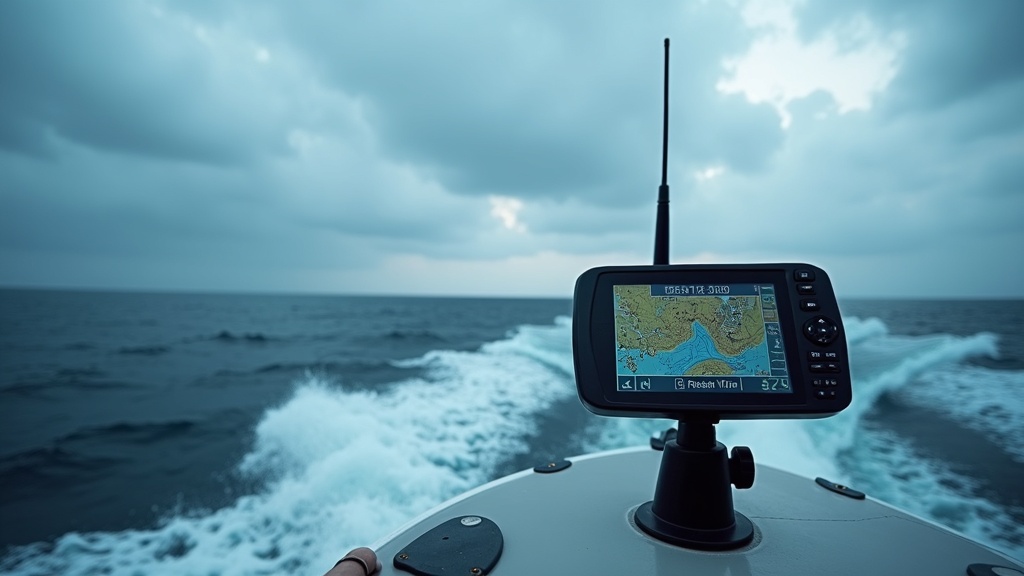
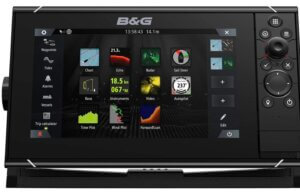
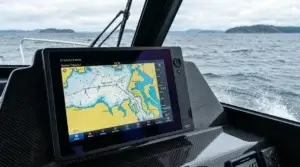
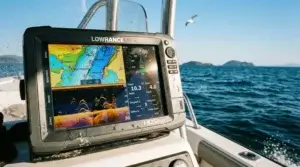
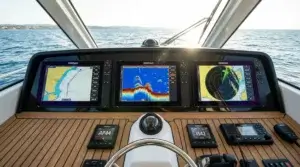
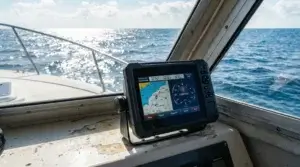
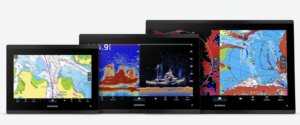

This is such a relevant and well-explained article! I’d never fully considered how much wave motion and satellite signal blockage could throw off GPS readings, but it makes complete sense.
The practical tips for cross-referencing with traditional tools like compass bearings and depth sounders are golden. It’s a crucial reminder that even with advanced tech, solid seamanship fundamentals are irreplaceable, especially when the sea gets rough.
Thanks for breaking down a complex issue into such understandable points, this is a must-read for anyone navigating in challenging conditions!
Thank you so much for your thoughtful comment! I’m really glad you found the article helpful and relevant. You’re absolutely right—technology is an incredible aid, but it can never fully replace the foundational skills that experienced mariners rely on. Understanding how factors like wave motion and signal interference affect GPS performance is key to staying safe and confident at sea. Combining tech with traditional navigation tools really is the best of both worlds. I truly appreciate you taking the time to share your insights!
Useful read. In rough seas, I have seen “jumping” position from multipath and antenna motion, plus over-aggressive smoothing that lags turns. What helped was a roof-mounted external antenna with clear sky, multi-constellation reception, higher update rate, and sensor fusion with a heading sensor or IMU, so the plotter is not relying on GPS alone. I also sanity check against a Doppler log or radar range and use RAIM or integrity alerts when available.
Two quick questions: where is the antenna mounted relative to the masts and radome, and what update rate and smoothing filters are you running on the plotter? Are you using differential corrections or multi-band GNSS to keep lock when the boat is pitching?
Marios
Thanks, Marios — great points.
Multipath and antenna motion in rough seas can definitely create some strange position “jumps,” and your approach of combining a clean-sky external antenna with sensor fusion is exactly the right way to stabilize things.
To your questions:
Antenna placement:
It’s mounted just forward of the mast line and a few feet below the radome. That keeps it out of the worst of the mast shadow while still maintaining a clean, 360° sky view. I also made sure it’s well clear of any high-current wiring runs to avoid interference.
Update rate and smoothing:
The plotter is running at a 10 Hz update rate with minimal smoothing enabled — basically enough to damp micro-oscillations but not enough to introduce turn lag. I found that aggressive filtering did more harm than good in tight maneuvers.
Corrections / GNSS bands:
I’m using differential corrections (SBAS) and multi-constellation reception, but not full dual-band yet. So far, it’s held lock through moderate pitching, though dual-band would definitely help in steeper seas.
Let me know if you’ve tested dual-band in heavy swell — I’m curious how much improvement you’ve seen.